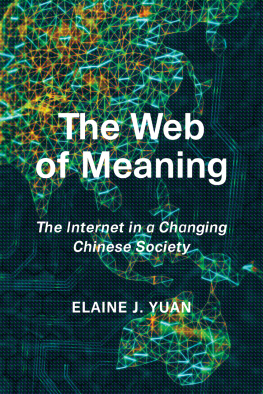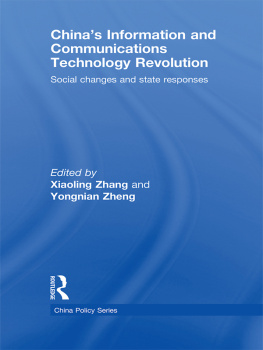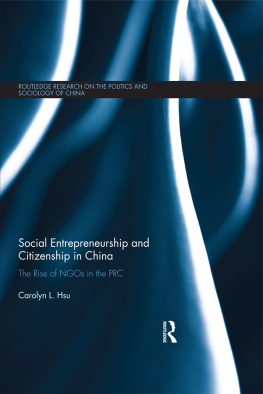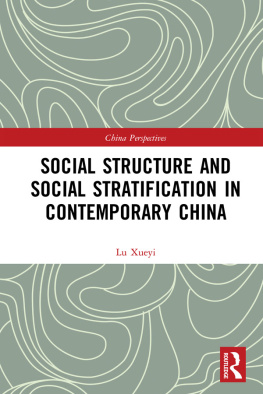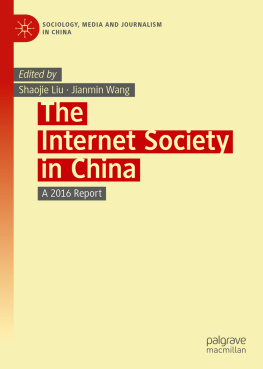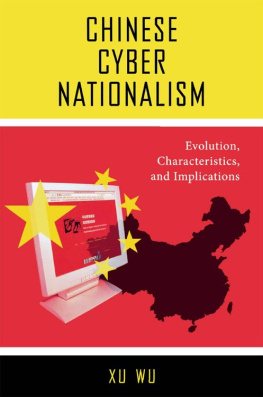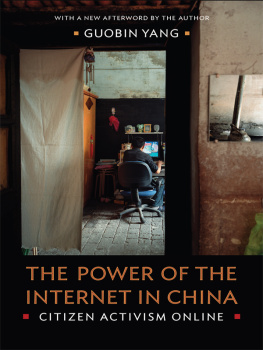Landmarks

THE WEB OF MEANING
The Web of Meaning
The Internet in a Changing Chinese Society
ELAINE J. YUAN
UNIVERSITY OF TORONTO PRESS
Toronto Buffalo London
University of Toronto Press 2021
Toronto Buffalo London
utorontopress.com
Printed in Canada
ISBN 978-1-4875-0813-5 (cloth)
ISBN 978-1-4875-3763-0 (EPUB)
ISBN 978-1-4875-3762-3 (PDF)
Library and Archives Canada Cataloguing in Publication
Title: The web of meaning: the Internet in a changing Chinese society /
Elaine J. Yuan.
Names: Yuan, Elaine J., 1974 author.
Description: Includes bibliographical references and index.
Identifiers: Canadiana (print) 20200412396 | Canadiana (ebook) 20200412485 | ISBN 9781487508135 (cloth) | ISBN 9781487537630 (EPUB) | ISBN 9781487537623 (PDF)
Subjects: LCSH: Internet Social aspects China. | LCSH: Social change China.
Classification: LCC HN740.Z9 I56 2021 | DDC 302.23/10951 dc23
This book has been published with the assistance of the Chiang Ching-Kuo Foundation for International Scholarly Exchange.
University of Toronto Press acknowledges the financial assistance to its publishing program of the Canada Council for the Arts and the Ontario Arts Council, an agency of the Government of Ontario.

Contents
The Web of Meaning couples together two of the most fascinating subjects of the past few decades in their fast and dizzying development: the Internet and China. Originally, the Internet was deemed universal, while China posed, at most, a special case, a local outlier, or even a threat. The enormous size and magnitude of the countrys recent development are fundamentally changing this situation and forcing us to reframe our questions and preconceptions about technology and society. The challenge has become how to understand and question media technology, its rapidly developing practices, and emerging communities of meaning in the specific political, economic, and cultural configuration of Chinese society while providing answers that speak to the concerns and interests of wider audiences.
This book has been written within the context of changing perspectives about the media in China. In my efforts to meet these challenges, I have benefited from comments, suggestions, criticisms, and encouragement from many people. I would like to take the opportunity to thank the following, who have supported this book in a variety of ways during its various stages of gestation. It goes without saying, of course, that this books errors or shortcomings are entirely my own.
Many colleagues in the Department of Communication at the University of Illinois at Chicago (UIC) were among the first to hear the initial ideas of the book and to provide feedback on the relevant empirical research. The many discussions with Jim Sosnoski helped me navigate semiotics and discourse analysis, new areas of interest that constituted the beginning of a cultural turn in my research orientation. Michael Schandorf provided valuable comments and meticulous editing of the draft proposal. Andy Rojecki and Siyuan Yin offered detailed comments on earlier drafts of some of the chapters. Kevin Sherman volunteered to help with the references. Zizi Papacharissi kindly introduced me to potential outlets for publication as the book neared completion.
The diverse network of scholars at the annual Chinese Internet Research Conferences whom I encountered over the years have also been a tremendous source of inspiration and help. My sincere gratitude goes to Ang Peng Hwa, Min Jiang, Randy Kluver, Jack Qiu, Cara Wallis, Marcella Szablewicz, Baohua Zhou, and Guobin Yang, who, together with numerous others, have worked diligently to provide not only an intellectual environment for research on the Chinese Internet but also a lively community of friendship and support.
A special shout out to my colleague Florian Schneider, the editor-in-chief of Asiascape: Digital Asia, whose effort to create this timely venue for research on digital communication in Asia has nurtured a growing community of researchers in the area, including myself. Zhongdang Pan and Guobing Yang, the editors of the journal Communication and the Public, are also among the leaders of the community, who have promoted the integration of scholarship from China with the rest of the International community.
My deep appreciation is also due to Eran Fisher and Erika Kuever, whose works provided much inspiration for my thinking about the network market, and to Jim Webster and Limin Liang, who have been very supportive with their input and comments along the way.
Many of the ideas in this book were previously aired at seminars, conferences, and workshops. These include a research seminar organized by Weishan Miao and Guohua Zeng in the Journalism and Communication Department at the Chinese Academy of Social Sciences; a presentation at the annual convention of the Association of Asian Studies in Toronto, with co-panelists Lin Zhang, Bingchun Meng, Yanning Huang, and Linliang Qian, and discussant Yongming Zhou; invited talks for the Peoples Internet project at the University of Copenhagen, a multi-nation endeavour led by Klaus Jensen and joined by Jun Liu and many other team members; an invited talk organized by Athina Karatzogianni at University of Leicester; a colloquium organized by Bingchun Meng at the London School of Economics and Political Science; a presentation at the symposium on the Digital Formations and Chinese Experiences: Creation, Appropriation, and Circulation, organized by Zhongdang Pan, Guobin Yang, and Lu Wei at the Penn Wharton China Center; an invited talk at the School of Public Policy and Management, Tsinghua University; an invited talk at EU-China Dialogue in Media and Communication Studies, Peking University; and an invited talk at the Communication Department, University of Macau.
I would like to extend my sincere gratitude to Aswin Punathambekar, Adrienne Shaw, Florian Schneider, and Lance Bennett for their valuable comments on the initial book proposal. In addition, I am deeply grateful to the institute of Humanities at the University of Illinois at Chicago, for the financial assistance that has made possible some of the fieldwork for this book. I am also indebted to May Zhao, and many other colleagues, from CTR Market Research in China for being supportive over the years and for providing the Sina Weibo data for this book project.
Some of the material presented in on cyber-nationalism appeared in Public Opinion in Chinese Social Media: The Diaoyu Islands Dispute on Sina Weibo, in The Dispute over the Diaoyou/Senkaku Islands: How Media Narratives Shape Public Opinion and Challenge the Global Order, edited by T.A. Hollihan, 26681 (New York: Palgrave, 2014). I would like to take the opportunity to thank James Danowski, my former colleague at UIC, for creating the powerful computer program for semantic network analysis, which I used for the analysis of privacy data. I am also grateful to Miao Feng, a resourceful graduate student of mine, for helping with collecting the data for the privacy project and with analysing the data for the piece on cyber-nationalism. And many thanks also go to Tom Hollihan, who provided the encouragement and opportunity for the research on cyber-nationalism.
Last but certainly not least, I would like to extend my warm gratitude to Peter F. Bang, or just LP, the only ancient historian who would, and has, read my manuscript from cover to cover, twice.

